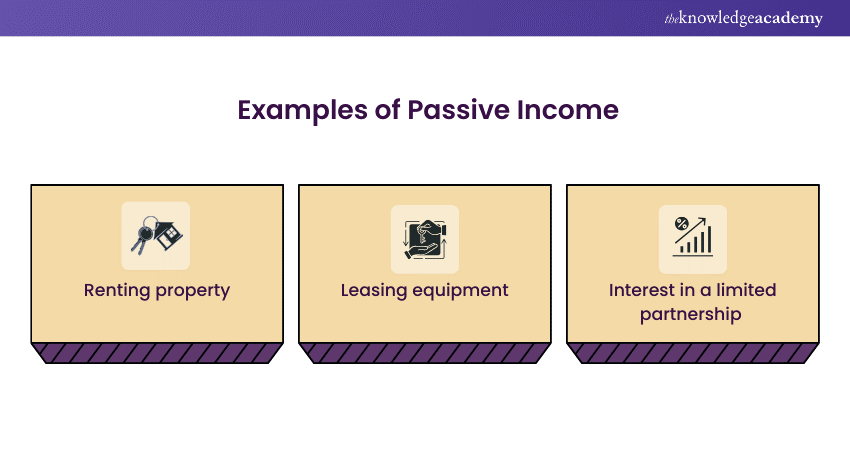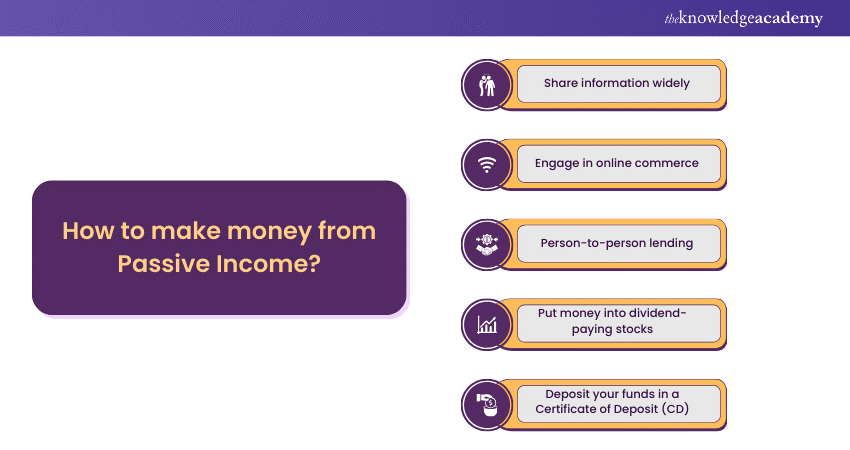We may not have the course you’re looking for. If you enquire or give us a call on 01344203999 and speak to our training experts, we may still be able to help with your training requirements.
Training Outcomes Within Your Budget!
We ensure quality, budget-alignment, and timely delivery by our expert instructors.

Passive Income refers to earnings derived from sources where active, daily involvement is not required. Unlike active income earned through direct labour or services, Passive Income streams generate continuous cash flow through various means such as rental properties, dividends from investments, royalties from intellectual property, or earnings from online business ventures.
The allure of Passive Income lies in its ability to provide financial stability and freedom. It allows individuals to earn money even when they are not actively working, opening possibilities for early retirement, financial independence, or the luxury of extra income. In this blog, you will learn What is Passive Income, its types, examples and more about how to make money from it. Read ahead to learn more!
Table of Contents
1) What is Passive Income?
2) Types of Passive Income
3) Examples of Passive Income
4) How do you make money from Passive Income?
5) Does Passive Income incur taxation?
6) Conclusion
What is Passive Income?
Passive Income is often defined as earnings derived from an enterprise in which a person is not actively involved. Unlike active income, where earnings are directly correlated with the amount of work done, Passive Income generates regular earnings from sources that do not require daily active involvement. The allure of Passive Income lies in its ability to provide financial security and freedom, as it can generate continuous income without the need for constant labour.
Types of Passive Income
Passive Income has become a cornerstone concept for those seeking financial freedom and diversification of income. Predominantly, it can be categorised into two broad types: income from creating and income from investing. Each category offers unique pathways to generate revenue with minimal ongoing effort. Let’s discuss:
1) Creating
a) Digital products: This includes eBooks, online courses, stock photography, or music. Once created and uploaded to the appropriate platforms, these products can be sold repeatedly without much additional effort, providing a steady income.
b) Blogging and content creation: Successful blogs or YouTube channels can generate substantial income through ad revenue, sponsorships, and affiliate marketing. While initial efforts in content creation and audience building are intensive, these channels can provide sustainable income over time.
c) App development: Developing a mobile app requires upfront effort, but once it's in the digital marketplace, it can earn money through downloads, in-app purchases, or advertisements.
d) Licensing and royalties: Artists, musicians, and inventors can earn Passive Income by licensing their work. Every time someone uses their creation, they receive a royalty payment.
2) Investing
a) Stock market investments: Investing in stocks, especially those that pay dividends, can provide a regular income stream. Dividend stocks pay out a portion of the company's earnings to shareholders, offering a Passive Income with the potential for capital appreciation.
b) Real estate investments: Buying property to rent out is a classic form of Passive Income. Investors can earn monthly rent, ideally exceeding the property's ongoing expenses. Real Estate Investment Trusts (REITs) also offer a way to invest in Real Estate without physically managing properties.
c) Peer-to-peer lending: This means lending money to individuals or businesses through online platforms. Investors earn Passive Income in interest payments, like how a bank makes interest on loans.
d) Bonds and fixed-income investments: Bonds and other fixed-income securities provide a steady income stream, typically in regular interest payments. While the returns might be lower than stocks, they are considered less risky.
Are you interested in earning Passive Income today? Register now for our Earn Passive Income Masterclass!
Examples of Passive Income
Passive Income has become increasingly popular to achieve financial freedom and stability. Individuals can diversify their revenue streams and build wealth over time by generating regular income without active involvement. Among the many forms of Passive Income, renting property, leasing equipment, and earning interest in a limited partnership stand out for their effectiveness and accessibility. Let’s see some examples:

1) Renting property
a) Residential rentals: Owning and renting residential properties is a classic form of Passive Income. This could be single-family homes, apartments, or even vacation rentals.
The income generated from tenants can cover mortgage payments and property maintenance and still yield a profit. The key to success in this area often lies in choosing the right location, maintaining the property well, and managing tenant relationships effectively.
b) Commercial real estate: Investing in commercial properties, such as office spaces, retail units, or warehouses, can also be lucrative. These often come with longer lease terms and can be more stable than residential rentals.
c) Short-term rentals: Platforms like Airbnb have popularised the concept of short-term rentals. These can offer higher returns than traditional leasing, though they may require more active management and marketing efforts.
2) Leasing equipment
a) Industrial equipment: Leasing out machinery or industrial equipment can be a profitable Passive Income stream. Businesses often prefer leasing to reduce capital expenditures, creating a market for leased equipment.
b) Vehicles: Fleet leasing and renting vehicles out to businesses or individuals can generate steady income. This includes everything from cars and trucks to more specialised vehicles.
c) Technology equipment: As technology rapidly evolves, many businesses lease equipment like servers, computers, or other tech hardware instead of purchasing them outright.
3) Interest in a limited partnership
a) Real estate investments: Limited partnerships in real estate allow investors to earn Passive Income without managing the properties themselves. These can include residential, commercial, or even large-scale developments.
b) Business ventures: Investing as a limited partner in a business can yield returns if the enterprise is profitable. This form of investment is typically more hands-off compared to direct business ownership.
c) Energy sector investments: Limited partnerships in sectors like oil, gas, or renewable energy projects can be another source of Passive Income. These often come with tax benefits but may also carry a higher risk.
Do you want to learn about Finance? Register now for our Finance for Non-Financial Managers Course!
How do you make money from Passive Income?
The allure of Passive Income lies in its promise of earning money with minimal ongoing effort. Let's explore some effective strategies for generating Passive Income:

1) Share information widely
a) Digital products: Creating and selling digital products like e-books, online courses, or webinars is a fantastic way to share knowledge and expertise. Once created, these products can be sold multiple times without additional cost.
b) Blogging and vlogging: Starting a blog or YouTube channel can become a significant income source. Through ad revenues, affiliate marketing, and sponsorships, Content Creators can earn substantial amounts. The key is to produce engaging, high-quality content and grow a dedicated audience.
c) Podcasting: Similarly, podcasting has emerged as a favoured medium. A podcast can be monetised through sponsorships, ads, and even premium subscription content.
2) Engage in online commerce
a) E-commerce stores: Setting up an online store on platforms like Shopify or Etsy can be lucrative. Using drop-shipping models, where a third-party handles inventory and shipping, can minimise the required active involvement.
b) Affiliate marketing: Promoting products or services and earning a commission for every sale made through your referral can be a solid income stream. This works well with a strong online presence or a blog with good traffic.
c) Stock photography: If you're a photographer, selling photos to stock photography websites can provide a steady income. Every time someone downloads your photograph, you earn a fee.
3) Person-to-person lending
a) Peer-to-peer (P2P) platforms allow individuals to lend money to others directly and earn interest. It's like being a bank but on a smaller scale. The risk can be mitigated by choosing platforms that vet borrowers and spread the investment across multiple loans.
4) Put money into dividend-paying stocks
a) Dividend stocks: Investing in companies that pay regular dividends is a classic form of Passive Income. These stocks provide payouts, typically quarterly, giving you a steady income stream.
b) Dividend funds: For those who prefer a more hands-off approach, investing in mutual funds or ETFs focusing on dividend stocks can be a good strategy.
5) Deposit your funds in a Certificate of Deposit (CD) or savings account
a) Certificates of Deposit: CDs offer a fixed interest rate for a period. They are a low-risk investment, typically offering higher interest rates than traditional savings accounts.
b) High-yield savings accounts: These accounts offer higher interest rates compared to regular savings accounts. While the returns might not be as high as other forms of Passive Income, they come with virtually no risk.
Become an expert in Accounting today – Sign up now for our Accounting & Finance Training!
Does Passive Income incur taxation?
While Passive Income offers a way to earn money without active involvement, it is essential to understand that it is not exempt from taxation. How Passive Income is taxed can significantly impact its net benefit. Let's look more into this subject:
Understanding Passive Income taxation
Let’s look at some of the points to understand Passive Income taxation:
a) Rental income taxation: Rental income is taxable and must be reported on your tax return. Expenses related to the rental property, such as mortgage interest, property tax, operating expenses, depreciation, and repairs, can be deducted. However, rental income can push your total income into a higher tax bracket, impacting the tax rate.
b) Dividends and interest taxation: Dividends from stocks or interest from bonds and savings accounts are also subject to taxes. The tax rate varies based on whether dividends are qualified or non-qualified. Qualified dividends are taxed at a lower capital gains rate, while non-qualified dividends are taxed as ordinary income.
c) Capital gains on investments: If you sell an investment like stocks or real estate for more than you paid, you will incur capital gains tax. Long-term capital gains (on assets held for more than a year) are taxed at lower rates than short-term gains.
d) Royalties and licensing income: Income from royalties, whether from a book, patent, or other intellectual property, is subject to taxation. The IRS considers this part of your ordinary income, and it's taxed accordingly.
e) Taxation on P2P lending: The interest you earn from peer-to-peer lending is taxable as income. The platform you use will usually provide a 1099-INT form showing the interest earned during the year.
f) Passive Income from business activities: Income from business activities in which you're not actively involved is still taxable. For instance, if you're a silent partner in a business, your share of the profits is subject to tax.
Tax deductions and credits
These points will explain more about tax deductions and credits:
a) Rental property depreciation: One of the significant tax advantages of owning rental property is the ability to depreciate the building and offset income.
b) Expense deductions: Expenses incurred in generating Passive Income, like maintenance costs for rental properties or transaction fees for stock sales, can often be deducted.
c) Tax credits: In some cases, you may be eligible for tax credits related to your Passive Income activities, which can reduce your tax liability dollar-for-dollar.
Tax planning for Passive Income
This is how you can plan your tax for your Passive Income:
a) Professional advice: Consulting a tax professional is advisable to understand the taxes incurred by Passive Income.
b) Keeping records: Maintaining detailed records of income and expenses related to your Passive Income activities is crucial for accurate tax filing.
c) Understanding tax laws: Tax laws change frequently, and staying informed can help plan and identify potential tax-saving opportunities.
Are you interested in learning more about financial modelling and helping your business grow? Register now for our Financial Modelling Course!
Conclusion
Passive Income offers a pathway to financial freedom and security. We hope that from this blog, you have understood What is Passive Income and its role in achieving financial freedom. It requires upfront effort, investment, or both but can lead to a steady income stream without actively working on it. Proper planning and an understanding of the tax implications can make Passive Income a valuable component of a balanced financial strategy.
Learn how to predict and stay ahead of your competitors with our Financial Modelling and Forecasting Training – Join now!
Frequently Asked Questions
Upcoming Digital Marketing Resources Batches & Dates
Date
 Passive Income Course
Passive Income Course
Fri 28th Jun 2024
Fri 19th Jul 2024
Fri 30th Aug 2024
Fri 27th Sep 2024
Fri 1st Nov 2024
Fri 29th Nov 2024
Fri 20th Dec 2024







 Top Rated Course
Top Rated Course



 If you wish to make any changes to your course, please
If you wish to make any changes to your course, please


